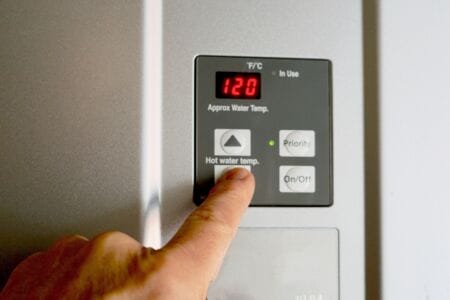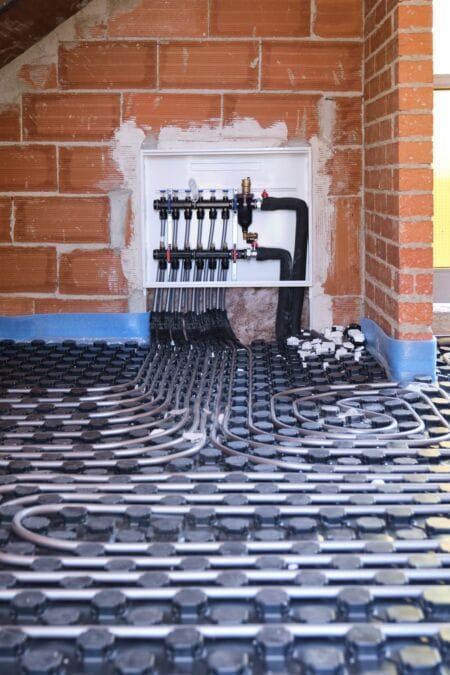Contents
ToggleWhat we'll cover...
Insights into Lot 20 legislation, and an explanation of the standards and features associated with Lot 20 accredited heating products.
What is Lot 20 and why was it introduced?
If you’ve been shopping around for an electric radiator or heater recently, chances are you’ve come across the term ‘Lot 20’. Sounds more like a lucky auction win than a heating regulation, doesn’t it? But in reality, Lot 20 is an important piece of European legislation designed to make electric heating more energy efficient. And let’s be honest – anything that can help cut energy bills without sacrificing warmth is a welcome addition to modern life.
Introduced as part of the EU’s Ecodesign Directive, this electric heating jurisdiction came into force on January 1st, 2018, with the aim of reducing wasted energy in electric heating appliances. Essentially, prior to this regulation, many electric radiators were about as efficient as leaving the oven door open to warm the house. The legislation ensures that all newly manufactured electric radiators, infrared panel heaters, and other fixed electric space heaters meet minimum efficiency standards, cutting down on emissions and saving homeowners money on their energy bills.
So, if you’re still clinging to an ancient electric heater that guzzles energy like a 90s dial-up modem struggling to load a web page, it’s probably time to consider an upgrade.
How Lot 20 affects electric radiators and heaters
So, what does this mean for your trusty electric radiator? Essentially, Lot 20 rules out inefficient, outdated models in favour of eco-friendly, smart heating solutions. Before 2018, electric heaters could be pretty basic – plug in, switch on, heat up, job done. But now, compliant models must include additional energy-saving features in order to pass regulations.
This means electric heaters must have at least one intelligent control function, such as:
- Digital thermostats
- Weekly programming
- Adaptive start control (learning when to turn on for optimal efficiency)
- Open window detection
These requirements ensure electric space heaters only use the energy they need, keeping costs down while making homes more sustainable. In other words, no more radiators blindly blasting out heat when you’ve left the windows open because your kitchen experiment went a little ‘too well’ and you drove the neighbours daft with the ringing of your smoke alarm.
Shopping for a new energy efficient radiator? Here’s what to check before you buy to ensure it is compliant with regulations:
- Smart heating controls – Look for smart heating controls in the form of digital thermostats, app connectivity, or programmable timers to maximise efficiency.
- Open window detection – This clever feature shuts off the heater when it senses a sudden temperature drop, stopping unnecessary energy use. No more heating the great outdoors for the sake of it!
- Adaptive start & learning functions – The best compliant radiators learn your heating habits and pre-heat the space accordingly. Like a pet dog that knows when dinner time is coming—except this one saves you money instead of begging for scraps.
- Eco & comfort modes – These settings allow you to switch between energy-saving and high-performance heating depending on your needs.
- Compliance labels – Reputable manufacturers will highlight Lot 20 compliance, so check the product description or packaging. If it’s not mentioned, it’s probably not compliant.
Energy efficiency features required for Lot 20 compliance
Lot 20 doesn’t just mean a heater is ‘eco-friendly’ – it enforces real efficiency improvements. Here’s a breakdown of the key features required for compliance:
- Programmable timers – Allows users to schedule heating times to suit their routine, avoiding wasted energy. No need to keep the heater on all day when you’re only in the room for a few hours.
- Electronic thermostats – Provide accurate temperature control to prevent overheating. No more guessing whether ‘medium’ means ‘toasty warm’ or ‘melt your socks off.’
- Smart room sensors – Detect when a room is unoccupied and adjust heating levels accordingly. If you’re the type who forgets to turn the lights off, this feature is tailor-made for you, and can help trim your energy bills.
- Wi-Fi & app connectivity – Some compliant models allow remote control, so you can adjust your heating on the go. Perfect for those moments when you’re tucked up in bed and don’t fancy getting up to turn the heating down.
- Reduced standby power consumption – Heaters must consume minimal energy when not in use to meet regulations. Because paying for a heater to sit there doing nothing is just plain silly.
The future of heating regulations and what it means for home heating
While Lot 20 has already helped improve the energy efficiency of electric heating, it’s likely that regulations will tighten further in the future. The push for carbon reduction and net-zero goals means manufacturers will need to keep on top of further innovations to meet even higher energy efficiency standards.
We may see developments such as:
- Further integration with renewable energy sources, such solar panels and battery storage options.
- Enhanced AI-driven heating controls, improving energy efficiency with predictive analytics.
- Stricter eco-design policies, potentially phasing out even more older and inefficient heating options.
- Heating systems that talk to your other smart devices, so your radiator can tell your coffee machine when to start brewing in the morning. Hey, we can dream!
One thing’s for sure – the legislation is just the beginning of a smarter, more sustainable approach to home heating. The good news? If you invest in a compliant space heater now, you’ll already be ahead of the game.
Invest in Lot 20 compliant heating solutions from BestHeating
Lot 20 might sound technical, but at its core, it’s all about helping you heat your home more efficiently. By replacing your existing radiators with a compliant electric radiator, you’ll be saving energy, reducing costs, and keeping your home warm the smart way. And let’s be honest – there’s nothing better than staying toasty while keeping a bit more cash in your pocket. Win-win!
For any more information, or to share your up-to-date and fully regulated heating setup with us, you can reach out via our social channels. Contact us on Instagram, Facebook or X.
John is a Research Specialist for the Best Heating Advice Centre, where for over nine years he has dedicated himself to demystifying home heating for our customers. He specialises in creating clear, data-driven guides and how-to articles by collaborating directly with our team of certified heating experts and product engineers.
His work, built on a foundation of journalistic research, has helped millions of readers make confident and informed decisions about their home heating. When he’s not breaking down the heat output differentials from radiators to heated towel rails, John fancies himself as a fine football and music connoisseur.







